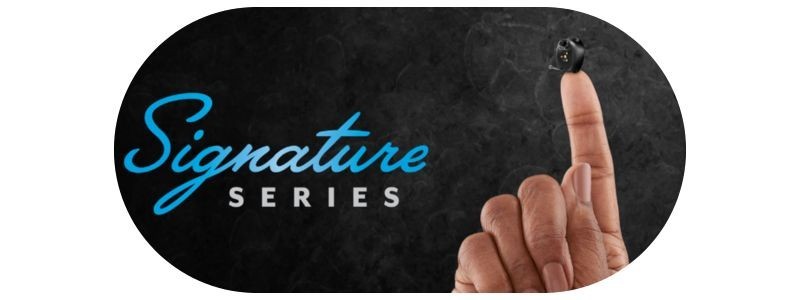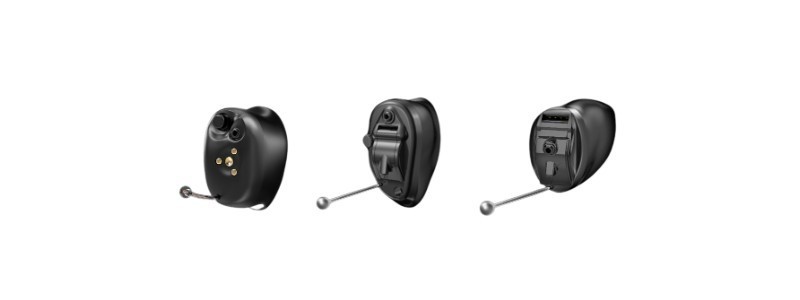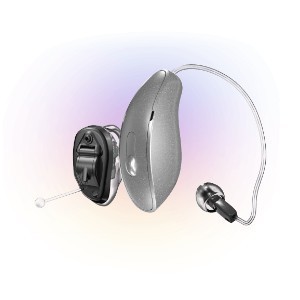Free home visits
with a local audiologist

Head of Customer Content Experience

Audiology Expert

Starkey launched their Signature Series, a CIC and IIC hearing aid upgrade since Genesis AI, in April 2024. A custom hearing aid collection, powered by the Genesis AI platform, created to give you clear sound and discretion with some enhancements thrown into the mix.
This range is clear, everybody wants to listen attentively to their family, friends, and the world around them. However, not everyone feels at ease openly acknowledging their hearing loss. Now, with the Signature Series, you can have both. Enjoy invisibility, natural sound (thanks to Neuro Sound technology), and a comfortably snug fit with this range.
In this article, we compare both the Signature Series vs Genesis AI, focusing on what has stayed the same, what has changed and what are the advantages of opting for the latest offering from Starkey.
By reading the below comparison, we hope you find answers to what the unique features of Genesis AI and Signature Series are, what sets them apart, and which line is best for you.
When looking at Genesis AI, the key elements to this range are the Edge Mode+ technology's automatic adaptability to shifts in acoustic environments for better hearing. Then there is the Motion Sensor Hearing, offering another highlight, giving you tailored sounds that reflect your movements for better clarity and focus.
Finally, AI Health Tracking, a wellness technology feature, caters to those who are health-conscious and like the idea of monitoring and managing their wellness. Genesis AI harnesses the power to track your heart rate, steps, and more - giving you the ability to change and maintain healthier life habits.
In comparison, the Signature Series puts discretion, simplicity, and convenience with an advanced rechargeable CIC model in the spotlight. All benefits are made possible without sacrificing sound experience.

When we talk about simplicity being a highlight of the Signature Series, it points to the fact that Starkey's non-wireless models don't have Bluetooth connectivity (mainly due to their size). So this means you can't do remote adjustments on the health app, for example, but that might just be what you're looking for.
There is a push button on the CIC model though, and the upgrade in the casing of the Signature Series line means it's lighter and thinner - giving you that smaller size and optimum wearing comfort whilst remaining strong and durable.
The Signature Series also switches the CIC 312 with the CIC R NW - trading its wireless abilities for rechargeability. In reality, this potentially adds to the smaller size as well as increasing its water protection.
The Signature Series is a 2nd generation Genesis AI range, and when broken down, the improvements are subtle. Signature provides a better Edge Mode+ and shows improvements in optimisation. For example, once activated, using an optional push button, Edge Mode+ now operates automatically.
This means it seamlessly transitions into a mode where it continuously scans, adapts, and optimises hearing based on changes in the surrounding listening environment. Thus, giving you clearer speech and improved listening comfort. However, please be aware that this feature is only available in the CIC models.
The incorporation of sensor technology within Genesis AI's technology now guides the hearing aid's adaptive directionality. This functionality operates in two ways, offering better environmental awareness and reduced feedback.

If you have already invested in Starkey Genesis AI, it wouldn't make sense to now upgrade to Signature, especially since Genesis AI is only a year old and the advancements in sound technology are slight. Wait a bit longer, Genesis is still a really good aid, and it's worth holding out for a big leap in technology that Starkey will, no doubt, release next.
If you are looking to upgrade and are tempted by the Signature Series, you need to consider your specific needs and lifestyle. If you are relatively tech-savvy, you might like the combination of technology and connectivity that Genesis AI brings.
On the other hand, you might prefer to keep your hearing loss low-profile, or perhaps you are looking for a user-friendly device. If discretion trumps connectivity and remote control of your hearing aids, then you will do very well with the Signature Series. Maybe the world's first fully custom rechargeable hearing aids (at launch) might have the power to swing it.
Hearing aid technology advances constantly and it's important to know when it's time to replace the ones you already have. For example, you might find that your current hearing aids aren't supporting your hearing like they used to.
This might be because your hearing loss has changed and you now need more features and programmes that aren't accessible to you.
Our audiologists can help you understand your new hearing loss needs and specifications and the hearing solutions that can get your hearing back on track.
Do not spend hundreds of pounds without getting a second opinion from us.
 Not only are the prices great, but the service is fantastic! Many thanks to your team.
Not only are the prices great, but the service is fantastic! Many thanks to your team.If you are looking at this page then it is likely that an audiologist has suggested that you purchase this particular hearing aid, so is this the best model for you?
In general, any audiologist will always be recommending to you the model that best suits your needs. Here is a useful check list to make sure that is the case.
If in doubt, feel free to give us a call. That's what we're here for.
If you have a significant hearing loss in both ears, you should be wearing two hearing aids. Here are the audiological reasons why:
Localisation. The brain decodes information from both ears and compares and contrasts them. By analysing the miniscule time delays as well as the difference in loudness of each sound reaching the ears, the person is able to accurately locate a sound source. Simply put, if you have better hearing on one side than the other, you can't accurately tell what direction sounds are coming from.
Less amplification required. A phenomena known as “binaural summation” means that the hearing aids can be set at a lower and more natural volume setting than than if you wore only one hearing aid.
Head shadow effect. High frequencies, the part of your hearing that gives clarity and meaning to speech sounds, cannot bend around your head. Only low frequencies can. Therefore if someone is talking on your unaided side you are likely to hear that they are speaking, but be unable to tell what they have said.
Noise reduction. The brain has it’s own built in noise reduction which is only really effective when it is receiving information from both ears. If only one ear is aided, even with the best hearing aid in the world, it will be difficult for you to hear in background noise as your brain is trying to retain all of the sounds (including background noise) rather than filtering it out.
Sound quality. We are designed to hear in stereo. Only hearing from one side sounds a lot less natural to us.
For most people, the main benefit of a rechargeable hearing aid is simple convenience. We are used to plugging in our phones and other devices overnight for them to charge up.
For anybody with poor dexterity or issues with their fingers, having a rechargeable aid makes a huge difference as normal hearing aid batteries are quite small and some people find them fiddly to change.
One downside is that if you forget to charge your hearing aid, then it is a problem that can't be instantly fixed. For most a 30 minute charge will get you at least two or three hours of hearing, but if you are the type of person who is likely to forget to plug them in regularly then you're probably better off with standard batteries.
Rechargeable aids are also a little bit bigger and are only available in behind the ear models.
Finally, just like with a mobile phone, the amount of charge you get on day one is not going to be the same as you get a few years down the line. Be sure to ask what the policy is with the manufacturer warranty when it comes to replacing the battery.
For most people, the answer is yes. But it's never that simple.
The majority of hearing problems affect the high frequencies a lot more than the low ones. Therefore open fitting hearing aids sound a lot more natural and ones that block your ears up can make your own voice sound like you are talking with your head in a bucket. Therefore in-ear aids tend to be less natural.
However the true answer is we can't tell until we have had a look in your ears to assess the size of your ear canal, and until we have tested your hearing to see which frequencies are being affected.
People with wider ear canals tend to have more flexibility, also there are open fitting modular CIC hearing aids now that do not block your ears.
There is also the age old rule to consider, that a hearing aid will not help you if it's sat in the drawer gathering dust. If the only hearing aid you would be happy wearing is one that people can't see, then that's what you should get.
Most people can adapt to any type of hearing aid, as long as they know what to expect. Have an honest conversation with your audiologist as to what your needs are.
Generally speaking, six or more. Unless it's none at all.
The number of channels a hearing aid has is often a simplistic way an audiologist will use to explain why one hearing aid is better than another, but channels are complex and it is really not that straightforward.
Hearing aids amplify sounds of different frequencies by different amounts. Most people have lost more high frequencies than low and therefore need more amplification in the high frequencies. The range of sounds you hear are split into frequency bands or channels and the hearing aids are set to provide the right amount of hearing at each frequency level.
Less than six channels and this cannot be done with much accuracy, so six is the magic number. However, a six channel aid is typically very basic with few other features and is suitable only for hearing a single speaker in a quiet room. The number of channels is not what you should be looking at, it's more the rest of the technology that comes with them.
As a final note, different manufacturers have different approaches. One method is not necessarily better than any other. For example some manufacturers have as many as 64 channels in their top aids. Most tend to have between 17 and 20. One manufacturer has no channels at all.
Hearing aids are easily lost, misplaced or damaged and typically are one of the most expensive personal possessions an individual can own. We offer hearing aid warranty cover for £80 per year per aid. Find out more here
All our audiologists use the very latest technology and provide the full range of tests to accurately measure your hearing for free. Find out about what we offer all our customers here
Hearing Aid UK offers all their customers free home visiting services and home visits for hearing aids - Including hearing tests, fittings, maintenance, check-ups and much more in the comfort of your own home and at your convenience. Find out more information here
Here, at Hearing Aid UK, we are dedicated to offering low hearing aid prices. We achieve this by having no head office and low marketing costs. Our hearing aid prices are amongst the lowest you will find anywhere in the world.
When we refer to a product as 'Latest Launch', we mean it is the latest to be released on the market.
When we refer to a product as 'New', we mean that the product is the newest hearing aid model on the market.
When we refer to a product as 'Superseded', we mean that there is a newer range available which replaces and improves on this product.
When we refer to a product as an 'Older Model', we mean that it is has been superseded by at least two more recent hearing aid ranges.